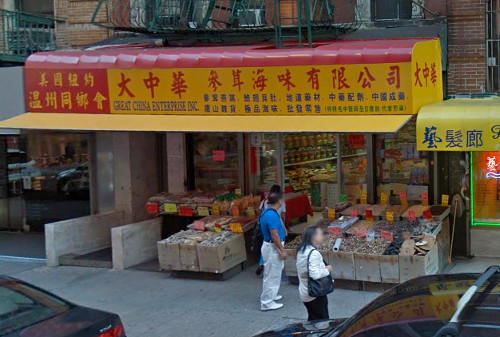Lynne Sachs talks about her film on immigrant experiences in Chinatown shift-bed houses.
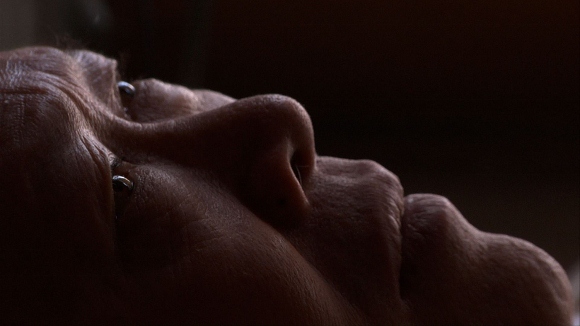
June 7, 2013
When director Lynne Sachs first got the idea to make a film about shift-bed houses, she googled “hot-bed house” and got X-rated results. That was three years ago. This past February, her film Your Day is My Night, which focuses on the stories of eight immigrants living in Chinatown shift-bed houses, made its global premiere at New York’s Museum of Modern Art. (A ‘shift-bed’ is a bed shared by people who are neither in the same family nor in a relationship.) Interspersing autobiographical monologues with half-scripted, half-improvised conversations, Your Day is My Night explores the space between documentary and scripted film, the resident and the city, and the domestic and the global. For Sachs, the bed becomes the symbolic place to traverse these gaps; she calls it a “floating land,” or a plane for the individual and history to struggle and to rest.
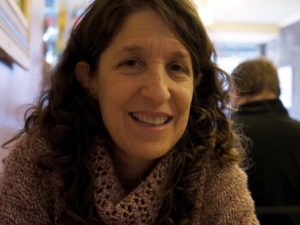
Seven out of the eight performers in the film are actual Chinese immigrants between the ages of 58 and 78. When they were first recruited from the Lin Sing Association, a welfare and rights organization in Chinatown, the assumption was that Sachs was looking for extras. But what makes Your Day is My Night remarkable is that the film gives lead roles to the non-white immigrant and elderly—people who are often invisible or silent in mainstream film, but who are here portrayed with a deep and varied humanity. We bear witness to the traumas of the Cultural Revolution through tales of their personal histories, as well as the prosaic bickering between the residents. (“These shoes are dirty. You know they’re not allowed inside.” “These shoes cost hundreds of dollars!”).
“Sachs seems to ask her audience, as well as herself: What are the limits of understanding?”
Yet, Sachs accomplishes this without speaking any Chinese. She relied on a team of translators throughout production. In fact, her struggle to understand her performers is mirrored in a scene where Lourdes, a Puerto Rican woman who lives in the shift-bed house, cannot understand what one of her Chinese roommates is saying. Though English translations for Lourdes are attempted, they are botched and awkward.
Sachs seems to ask her audience, as well as herself: What are the limits of understanding? Kyla Cheung caught up with Lynne Sachs to talk about the inspiration behind and the making of her film.
Open City: Can you speak about the genesis of the film?
Lynne Sachs: In 2010 I had a conversation with a distant cousin who was telling me about a plane wreck here in Brooklyn. It was the 50th anniversary of the wreck. He said two planes crashed over Staten Island. I knew the people in the plane had died, but I said, “What about the people on the ground?” His reply? “It’s hard to tell. There were so many hot-bed houses.” I had no idea what a hot-bed house was, so he explained that it’s a house where people live in shifts and share beds. They come and go over a period of weeks, and it’s usually people who worked on the docks, like shoremen. So I got interested in showing what it would be like for a group of adults to live together and for their lives to intersect. I wondered what kind of stories they would tell each other, what sort of things they’d witness and what intimacies would be revealed.
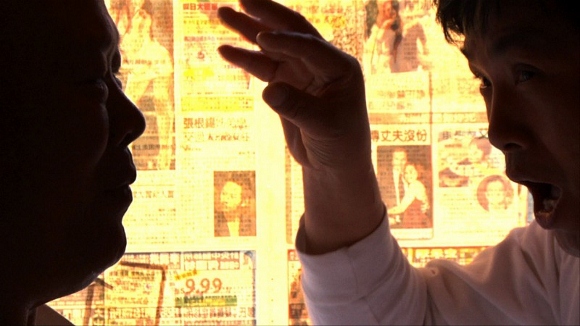
Can you explain the casting process with the actors?
Sometimes when interviewing actors, when you ask very precise questions and ask more about sensations and moments rather than big abstract questions, they start to reveal more. So, when I asked a question like, “Could you tell me what it was like at any point in your life when you were either sharing a bed or something happened to you,” I didn’t know that all those stories about China—or what we call The Cultural Revolution here—were going to come out of their experiences. The violence they saw was stunning to me. It was like talking to someone who had lived through the Holocaust. Who knew that the conversational catalyst, a bed, which is something you would think would be very protected, would lead to stories so vulnerable and so life-shattering?
Immigration is a huge hot button issue right now. How, politically, do you view your film? Or do you want to resist any sort of political context?
One of our performers does not have his documentation. At all. He actually hired an immigration lawyer in Chinatown to help him. The lawyer had heard about my movie and came up with the bright idea for him to get political exile because he mentions things about China in the film. It could be a reason he could have a problem returning to China. I was like, whatever. If you want me to do something to help you, I will. I wrote a letter supporting his political exile saying that it could cause problems. That was about two months ago. The attorney said, “Great letter! This is going to make all the difference!” Then, in December, we noticed online that a bunch of Chinatown lawyers were arrested by the FBI. A sweep, for falsifying political situations. Guess what? His lawyer was one of those lawyers.
Oh god.
But, he’s not in trouble. He didn’t do anything wrong. But, the story ended up in the New York Times. It was a big deal. Those lawyers were teaching people to pretend they had forced abortions when they hadn’t.
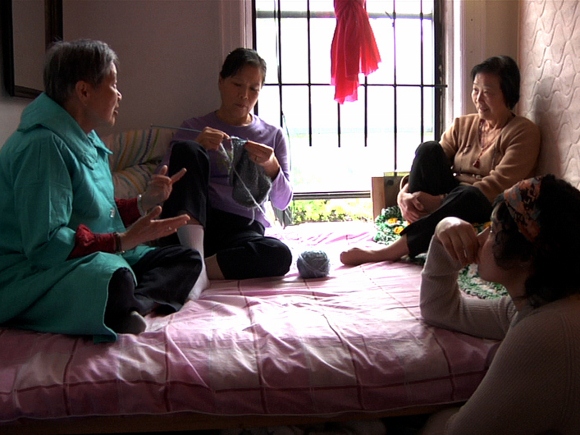
There is only one character you actually give a name to in your film—Lourdes [a Puerto Rican character, played by Veraalba Santa, who comes to live with the much older Chinese immigrants in the shift-bed house]. Why is that? When she comes into the movie, the other performers say things like “Oh, she’s a Westerner.” She has language problems that are interesting in that the viewer is being able to understand what is being said but she is totally out of it.
I figured out pretty quickly that I didn’t want to present the Chinese world as absolutely hermetic and completely separated. I realize that in all immigrant communities there is a level of porousness so that other kinds of discourses and languages and experiences come and go. There are these fissures in which things happen that trigger some sort of change. So, I kind of inverted it. I made Lourdes an immigrant in their world. She doesn’t speak the language. So Lourdes becomes a little bit like me, like us. She’s an outsider. And the Chinese day workers are outsiders, too. They exist in this country not speaking the language and are separate.
So, she’s our witness?
Yes. She has to witness. She has to process a bit. Part of film making is creating situations that are almost like a game. I threw Lourdes in and said, “Let’s see what happens.” And they started that whole thing of “What’s that Westerner doing here?” And actually, I didn’t know they had even said it until I had been editing that material for several months. Bryan [one of the film’s translators and editors] pointed it out. I thought they were just chatting about the kitchen. The other thing about Lourdes was she represented a different generation. She’s younger. Her purposes for travel are sort of products of a different generation: She travels because she is curious. Because it will change her. Because, she will grow up.
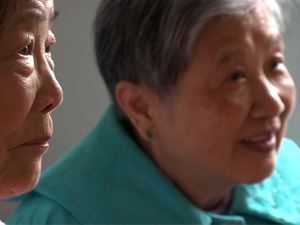
You were even talking about avoiding making their community seem “hermetic,” or even insular, even though some of the press says this movie “offers a rare glimpse into a hidden world…”
I know [makes a face]. One thing about making social issue documentaries is that there’s a tendency by the filmmaker to think that they know best or they’ve come to some realization that nobody else has ever come to. Or their film will prove such and such a point. For example, when you tell people about the “shift-bed” situation, there’s always this response which is always like a breath of “Whoa. What a struggle. That’s so sad.” I don’t think my film says that, although there’s struggle throughout the movie.
One of the things I saw that was really—and this word is overused—empowering for those people is that there was this sense of a microcommunity. Where you come home to a place where people are talking, adults are interacting and it’s not just about the nuclear family. Where there is this criss-crossing of experiences. I think that helped me see the measure of success is not necessarily that you make enough money that you can get out of that shift-bed situation.
On Saturday, June 8, Lynne Sachs will be screening her documentary “Your Day is My Night” at an event at Union Docs in Brooklyn. Joining her will be with photographer Annie Ling, who will share a slideshow of her photographs of residents at 81 Bowery in Chinatown.
For more information, visit Lynn Sach’s website.



